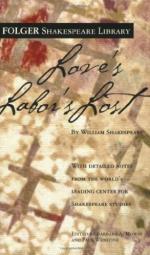|
This section contains 4,943 words (approx. 17 pages at 300 words per page) |

|
SOURCE: "Love's Labor's Lost," in Friends and Lovers: The Phenomenology of Desire in Shakespearean Comedy, Columbia University Press, 1985, pp. 110-20.
In this essay, MacCary uses the character Berowne to examine Shakespeare's development of masculine love in the play from an idealized desire of women to a recognition of women as real and therefore unpredictable individuals.
The principles of Shakespearean comedy which I have delineated theoretically and have traced in The Comedy of Errors and The Two Gentlemen of Verona—variety and progression in the orientation of desire and its relation to worldview generally—are readily discernible in Love's Labor's Lost. I have suggested that Shakespeare distinguishes four types of object-choice and presents these in a continuum suggesting development. A young man is first obsessed with a mirror image of himself; the melancholy of Antipholus of Syracuse as he seeks his lost twin represents this case in its extreme...
|
This section contains 4,943 words (approx. 17 pages at 300 words per page) |

|


